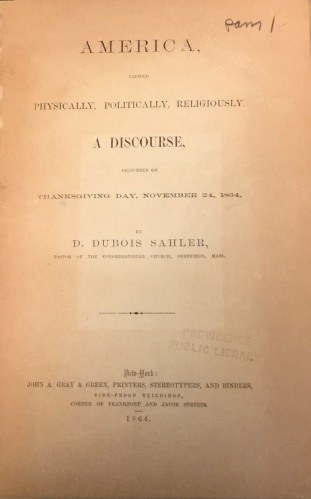First, a quick note: tomorrow (November 22nd), the library is closing early, so our Special Collections open hours will be abbreviated, running from 3:00-5:00 (instead of the usual Wednesday hours of 3:00-7:00).
Second: Have you been sitting at your computer thinking, “gosh, I wonder what people in Sheffield, Mass. were doing 153 years ago on Thanksgiving?” Well, are YOU ever in luck! Today we’re featuring a pamphlet with a discourse delivered in Sheffield on Thanksgiving Day during the American Civil War. (It’s not very exciting-looking, admittedly.)

As you likely already know, Thanksgiving has been celebrated in the United States as a harvest celebration since a presidential proclamation in 1789, and became a federal holiday in 1863 when President Abraham Lincoln called for a nationwide day of “Thanksgiving and Praise to our beneficent Father who dwelleth in the Heavens.” (In the interest of historical accuracy regarding early Thanksgiving celebrations, we’d like to recommend the article from today’s New York Times entitled “Most Everything You Learned About Thanksgiving is Wrong.”)
The discourse in the pamphlet above was delivered one year after Lincoln’s proclamation by D. Dubois Sahler, the pastor of Sheffield’s Congregational Church. (It’s unclear whether it was delivered in the Congregational Church, but that seems likely. Sheffield’s Congregational Church building was erected in 1760 and still stands–check out their website, or look at this not-very-beautiful street view of the beautiful church from Google maps):
Sahler’s discourse is like a hit parade of popular 19th century Christian topics. He praises the United States for its beauty and its fertile land, gifts from God to remind us of His Heavenly intent and to keep us secure from famine:

In the North lies a chain of lakes or inland seas. They claim, after their kind, preeminence in beauty and extent. Our coasts present inviting harbors to the mariner. The Hudson, with an easy grace, carries away the crown for attractiveness from other rivers… In the center and heart of our country are found the almost unlimited prairies. We see them in the flowery bloom of spring, and in the green and gold of their summer attire. Once beheld, they can never be forgotten… From east to west, ten thousand valleys, springs, and rivulets reflect the smiles of Heaven. Mountain chains traverse the country and vary the landscape…
The hit parade continues with a good dose of xenophobia, as Sahler praises the Pacific Ocean for keeping the United States at a great distance from Asia and its purported atheists:

Upon our Western borders… the Pacific rolls for ten thousand miles its silver tides. Beyond, lie those mysteries of human existence, the nations of Asia. It is well that their crowded and suffocating millions are not at our doors. The characteristics of these nations are insatiable avarice and ututterable atheism. Their proximity would be the omen of a moral and physical struggle of portentous magnitude and duration. Our virtue and our patriotism might not save us from terrible disaster or destruction. The widest expanse of water on the earth is made to separate between us and them.
Phew. He then discusses slavery as a familiar yet immoral institution, and describes the Civil War as a moment for “a nation’s ruin or regeneration.” Sahler’s language here is especially interesting in light of current media focus on political polarization in America:

We are here reminded we can not be mere spectators of this national drama. We are actors in these scenes. There are things for us to determine and to do. Present duty demands our attention. Let us attempt to follow its direction.
As a nation, we are evidently entering upon a new era. The time has, therefore, come when those who have been opposites as to governmental policy should be reconciled, and mutually forgive. Let, therefore, the past be past. Let the bitterness, the partisanship, and the sectional feeling which have arisen sink forever in the depth of generous forgetfulness.
Unfortunately, the tensions from the Civil War have not exactly sunk “forever in the depth of generous forgetfulness,” even 153 years after Saleh delivered his discourse. I’m also fairly confident that many of us will be discussing these same issues at our Thanksgiving tables later this week.
If you’d like to read more of this pamphlet, or any of our many other pro- and anti-slavery Civil War pamphlets, please visit during our open hours or make an appointment!
Leave a comment